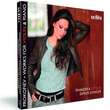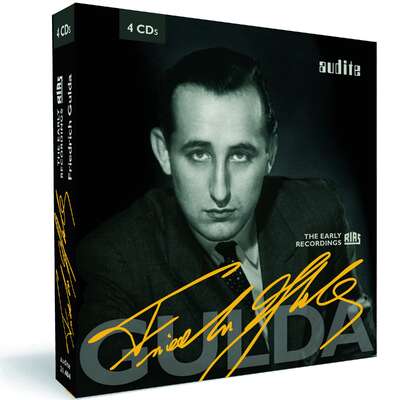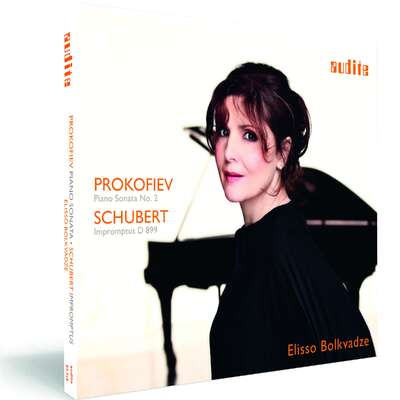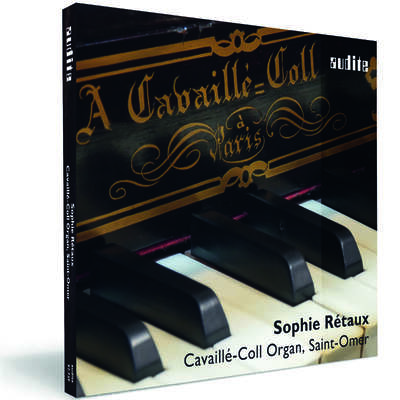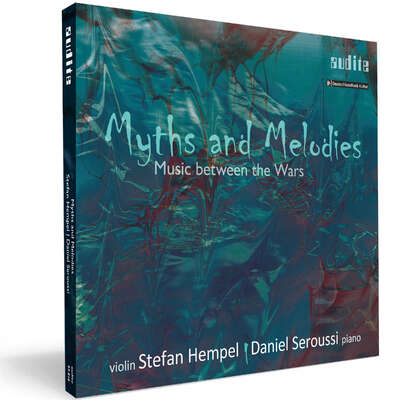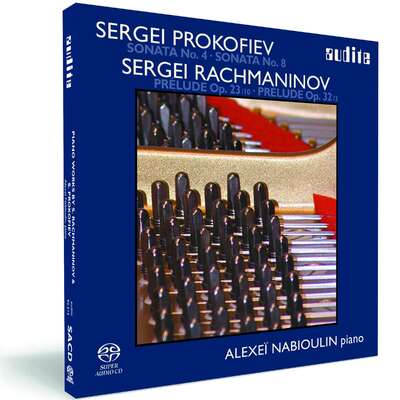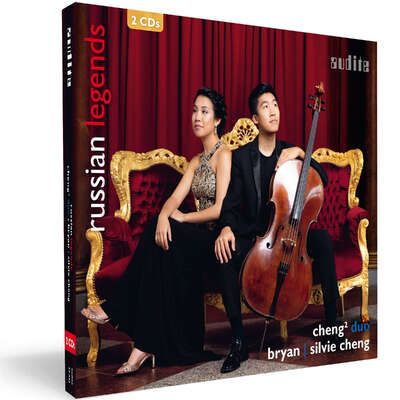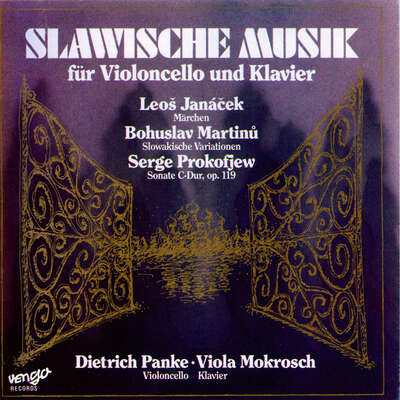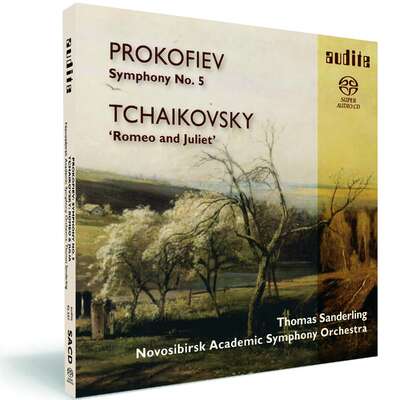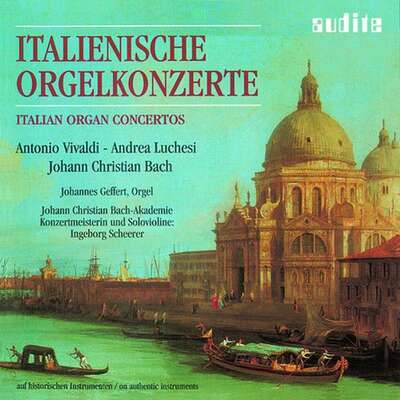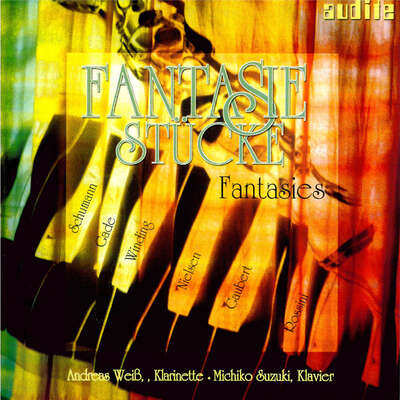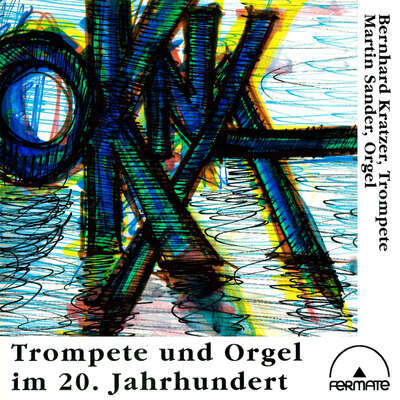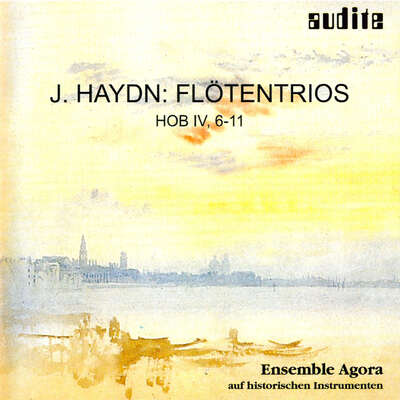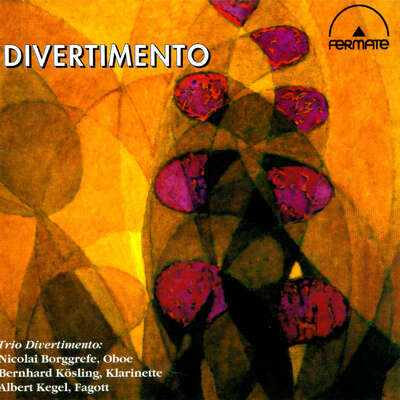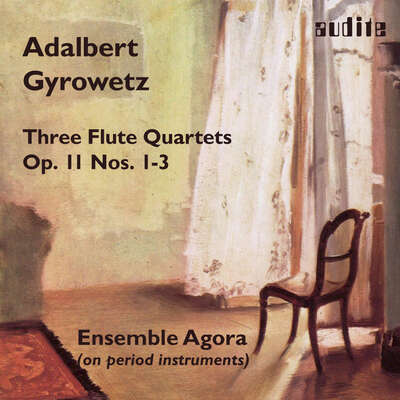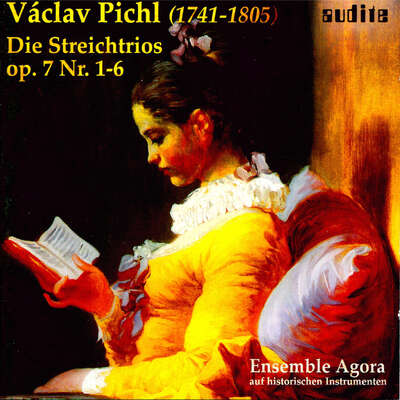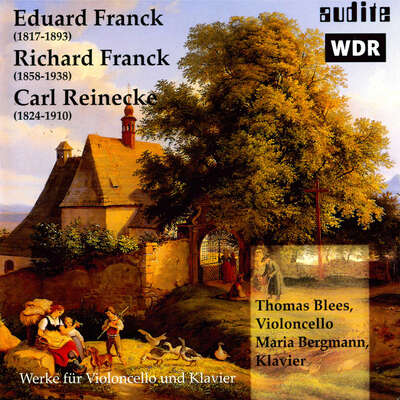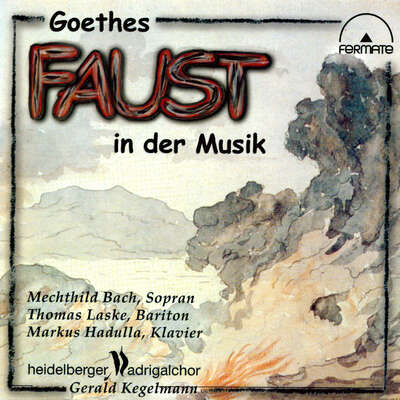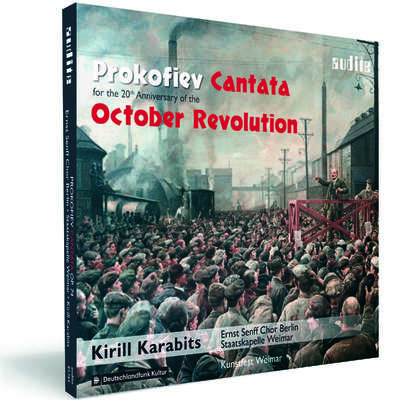
Sergei Prokofiev’s two Violin Sonatas, written during the 1940s, embody the deep dichotomy that characterised the composer’s life, feeling and work. The tragic Sonata No. 1 in F minor and the predominantly cheerful Sonata No. 2 in D major appear as two contrasting poles within his oeuvre. Prokofiev’s emotionally intensive melodies also unmistakably emerge in his own arrangement of the Cinq melodies for violin and piano.more
"Die Interpretation von Franziska Pietsch und Detlev Eisinger bewegt sich zwischen tastender Einfühlung und auftrumpfender Virtuosität. Hier haben zwei auch zwischen den Noten gelesen und wissen genau, was sie spielen. Fesselnd!" (Image Hifi)
Details
|
Sergei Prokofiev: Works for Violin & Piano
Violin Sonatas, Op. 80 & 94b, Cinq mélodies, Op. 35b |
|
| article number: | 97.722 |
|---|---|
| EAN barcode: | 4022143977229 |
| price group: | BCA |
| release date: | 20. May 2016 |
| total time: | 68 min. |
Bonus Material
Informationen
"The performers give off sparks playing these works (...).These pieces need to be played exactly in this energetic, dramatic, rhythmically accentuated and pronounced manner for then they reveal their beauty, at once austere and lyrical, most intensely."
(Südwest Presse)
Following the successful release of the Grieg Violin Sonatas, Franziska Pietsch and her piano partner Detlev Eisinger now present music by Sergei Prokofiev on the audite label. His works reflect facets of her own biography to a significant degree. As an emerging talent in the GDR, Franziska Pietsch enjoyed special state support; her musical training was thus initially shaped by the Eastern European school, bringing Prokofiev's music close to her heart. His two Violin Sonatas appear as two contrasting poles within his oeuvre - her life has also moved between extremes. The state support led to early success in the GDR. However, her father's escape to the West in 1984 was followed by two years of reprisals by the regime, intensively shaping Franziska Pietsch's understanding of music: deprived of any possibility of playing concerts or taking lessons, her chosen path towards hope - against desperation, refusal, fear and despotism - led inwards. Music became the only language in which she was able to express herself freely and which gave her the necessary strength to withstand external circumstances, continuing to hope for freedom. These were the origins of the intensity and artistic depth which characterise Franziska Pietsch's playing to the present day.
The two Violin Sonatas, written largely between 1938 and 1946 after Prokofiev's return to the Soviet Union, could not be more contrary: No 1 in F minor, Prokofiev's "Appassionata", is a tragic piece, whilst No 2 in D major, originally conceived for flute and piano, is predominantly joyful and serene. Prokofiev arranged it himself, with David Oistrakh advising him. The reworked version of the Cinq mélodies, composed in 1919/20 for voice (without text) and piano accompaniment, was also produced by Prokofiev himself. These chamber works expose three intrinsic aspects of his artistry: his ability to create a seamless, emotionally intense melodic line; his often concealed tragic side; and his classicist inclination.Reviews
Süddeutsche Zeitung | Magazin Heft 26/2019 27. Juni 2019 | Carolin Pirich | June 27, 2019
GEGEN DEN STRICH
Als sie jung war, blockierte die DDR ihre Karriere. Jetzt stößt sie an die Grenzen der Musikbranche. Aber Grenzen sind ihre Spezialität: die erstaunliche Geschichte der Ausnahmegeigerin Franziska Pietsch
Sie fragt: Vielleicht möchten Sie mich in Aktion sehen? Man hätte dannMehr lesen
www.limelightmagazine.com.au | December 2, 2016 | Angus McPherson | December 2, 2016 | source: http://www.limel...
It is the earthy directness of violinist Franziska Pietsch’s sound, overMehr lesen
Das Orchester | 12/2016 | Gero Schreier | December 1, 2016 | source: http://www.dasor...
Ausdruck geht hier über Glättung und Schönfärberei. Von Anfang an reißt Pietschs präsenter, hochexpressiver Geigenton die Aufmerksamkeit geradezu an sich. Mehr lesen
American Record Guide | November 2016 | Joseph Magil | November 1, 2016
I reviewed Franziska Pietsch and Detlev Eisinger’s recording of Grieg’s violin sonatas in the January issue. I enjoyed them, and I found PietschMehr lesen
Pietsch was born into a musical family in East Germany at Halle (near Leipzig) in 1969. She studied with special state support until 1984, when her father escaped to the West. She suffered reprisals from the state until she was able to move to West Germany with her mother and younger sister in 1986. She continued her studies in the West with celebrated teachers like Ulf Hoelscher and Dorothy DeLay.
The booklet notes point out that she has an affinity for Prokofieff, and I can only add after listening to this that she has it in spades. I hear this in Sonata 1. She is completely inside this music, which is reputed to be a monument to the victims of Stalin’s purges. I know of only two other performances of this masterpiece that I can place in the same league as this one: Kai Gluesteen and Catherine Odronneau (May/June 2004) and David Oistrakh and Sviatoslav Richter (Jan/Feb 1999).
Although I can think of two other recordings of Sonata 1 that I can place in the same league as this one, I cannot say the same for Pietsch and Eisinger’s performance of Sonata 2. It is in a class by itself. Arranged from Prokofieff’s Flute Sonata, it is a very beautiful work, though it has always stood in the shadow of its illustrious companion. Pietsch plays it as if it is the greatest violin sonata ever written. She finds contrasts of light and shade that others miss, and her very expressive nuances are timed to split-second perfection. One of the most notable things about this reading is that she and her partner make more of the tempo changes indicated in the score than any other duo I’ve heard. As in her Grieg recording, her playing at low dynamic levels is unusually expressive.
I have heard the Five Melodies many times before, usually included with recordings of the sonatas. I had never paid much attention to them until now. Pietsch plays these works as if she is playing five masterpieces. She makes you hang on every note. It’s as though I had never heard these works before. As in the sonatas, the playing is so expressive that it is impossible not to be riveted to the music.
I have loved the sonatas since I was a boy and first heard them on Itzhak Perlman and Vladimir Ashkenazy’s RCA recording. Those are very fine performances, but I couldn’t say that their reading of either work is one of the absolutely best available. I can say that about this recording though. Pietsch and Eisinger’s reading of Sonata 1 is among the very best available, and their reading of Sonata 2 is easily the best that I know. Add to these remarkable performances of the sonatas the also remarkable performance of the Five Melodies, and you have one of the greatest recordings of this or any music that I have ever heard.
Eisinger plays a brand of piano that I had never heard of before, Steingraeber and Sons, which was founded in 1820 in Germany and is found in Bayreuth. It sounds very good. Pietsch plays a violin made by Carlo Antonio Testore in Milan in 1751. Some millionaire should give her a Stradivarius or a Guarnerius. She deserves one.
Fono Forum | November 2016 | Norbert Hornig | November 1, 2016
Klangliches Raffinement, lyrische Empfindsamkeit, der markante Zugriff und effektvoll ausgespielte Kontraste: Die Geigerin Franziska Pietsch verfügtMehr lesen
Fanfare | October 2016 | Huntley Dent | October 1, 2016
Whenever I confront a new Prokofiev CD—this issue of Fanfare brought four of them—his circumstances in the Soviet Union can’t help but come toMehr lesen
In this new release the intensely serious violinist Franziska Pietsch expresses a strong personal connection with the piece, in that she was born in East Germany, coddled and supported as a child star by the government, only to be oppressed for two years after her father escaped to the West in 1984. After her own emigration in 1986 and a peripatetic education that included studies with Dorothy DeLay at Juilliard, Pietsch has had a varied career as a concertmaster, touring soloist, and chamber music player. I first noticed her as a member of the accomplished Testore Trio, a group she helped found in Germany in 2000 and only recently left in 2015. I was quite impressed by their disc of Tchaikovsky and Rachmaninoff piano trios (Fanfare 38:5).
All of this is prelude to a powerful performance of the Prokofiev First Violin Sonata that vies with brooding, dark readings from luminaries such as David Oistrakh and Sviatoslav Richter or Gidon Kremer and Martha Argerich. The score’s four movements, lasting a few seconds shy of half an hour, are a stark testimonial to a time of horror, yet one feels Prokofiev’s struggle to suppress his general extroversion, Romantic lyricism, and cheerful animation. Those qualities were saved for the Second Violin Sonata, written during the war years when the First Sonata was still laid aside. Originally scored for flute and piano, the Second Sonata was transcribed for violin with the aid of David Oistrakh; Prokofiev noted that the transferal of the flute part was relatively easy and that the piano part remained basically untouched.
Pietsch and her longtime duo partner, Detlev Eisinger, concede nothing to more famous rivals in terms of agonized emotion and a willingness to dig deep into the core of the music. To some extent the reading sounds artificially outsized because of the roomy, boomy acoustic in which it was recorded and the enormous dynamic range captured by the engineers (this isn’t an easy CD to find the right volume level for). It’s hard to return willingly or often to the dystopian gloom of the First Violin Sonata, and I must admit that Pietsch’s approach, although not as savage as some (I have Isaac Stern in mind), left me shaken. In the Second Sonata, best loved for its beautifully lyrical first movement and striding, confident finale, Pietsch and Eisinger remain more serious than other performers who take their cue from the gentle flute original. But it’s quite valid to exploit the violin’s expressive range in its own right.
The program is filled out with another transcription, the Cinq Mélodies, op. 35b, written in Chicago and California in 1919–20, after Prokofiev’s initial exile from Russia. Probably inspired by the vocalises written by Rachmaninoff and Ravel, the original version was for wordless soprano. This proved impractical, however, and the songs only gained popularity after being transcribed for violin. Besides the fact that the melodies themselves are uncharacteristically generic for Prokofiev, the violin part has very limited technical display. One listen-through seemed sufficient. Pietsch’s reading is sympathetic and adroit.
Altogether, this new release presents a rare bond between one artist and a particular score. If a single performance could qualify for my 2016 Want List, it would be Pietsch’s account of the Prokofiev First Violin Sonata. It won’t soon fade from memory.
Audio | 09/2016 | Andreas Fritz | September 1, 2016
Gegensätzlicher können zwei Violinsonaten eines Komponisten nicht sein: die erste tragisch, die zweite ausgelassen. Sie stehen beispielhaft für dieMehr lesen
Stereoplay | 09|2016 | Lothar Brandt | September 1, 2016 HighClass in HiRes
Das ausgewählte Finale ist ein kraftvolles Spiel der Farben und Rhythmen. Die in Ostberlin aufgewachsene Geigerin Franziska Pietsch hat bereits die Grieg-Sonaten für Audite produziert. Mit ihrem Klavierpartner Detlev Eisinger erfüllt sie auch Prokofieff-Werke mit tiefster Intensität.Mehr lesen
www.musicweb-international.com | Monday August 22nd | Richard Kraus | August 22, 2016 | source: http://www.music...
Of Prokofiev’s three chamber works for violin and piano, only the first sonata was originally conceived for the violin, and that work took eightMehr lesen
Prokofiev, the pianist, did not play the violin, which explains some of the enthusiasm for transcribing his earlier works. His slow progress on the first sonata seems in part to have been from political shock at Stalin’s great purge, launched shortly after Prokofiev’s return to Russia. In addition, the composer kept putting it aside for bigger commissions, such as the opera, War and Peace.
Even after the first public performance in 1946, Prokofiev continued to alter the score. He was unsatisfied with the sober performance by Oistrakh and Lev Oberin. Prokofiev kept inserting dynamic markings so that their interpretation (“like two old professors”) would not establish a standard. Yet at Prokofiev’s 1953 funeral, it was Oistrakh who played the first and third movements, which were deemed to be among the few pieces in the composer’s legacy which were not fundamentally happy and optimistic.
Franziska Pietsch is a German violinist, once a prodigy in the German Democratic Republic. She and Detlev Eisinger offer big-boned and fully engaged readings of these works. Prokofiev set the dark tone for the first sonata by describing the violin’s muted runs in the first and last movements as an “autumn evening wind blowing across a neglected cemetery grave.” Pietsch and Eisinger are appropriately disquieting, with dramatic gestures and technical assurance.
Alina Ibragimova and Steven Osborne recorded the same works for Hyperion in 2014, to much praise. Both recordings are quite excellent, but they differ in which Russian composer is imagined to be Prokofiev’s musical cousin. Ibragimova and Osborne place Prokofiev in proximity to Stravinsky’s aesthetic world, stressing the cool, detached neoclassical elements that exist in both sonatas. In contrast, Pietsch and Eisinger’s Prokofiev seems closer to Shostakovich, with anxiety never far beneath the surface. Their performances are less tightly controlled, more boisterous, urgent, and energetic. Thus the Andante of the first sonata soars serenely in Ibragamova’s hands, but unsettles a bit in Pietsch. The final Allegrissimo at times sounds merry for Ibragamova but darker and harsher for Pietsch. Both performances give enormous pleasure, but each is shaped by a different conception of the music.
The Cinq mélodies are more than filler, but are well-played but light-weight companions to the pair of violin sonatas.
The recording has a slightly cavernous, churchly sound. Why do music producers imagine that empty churches offer a happy location for recording chamber music? But as with many audio complaints, this one ceases to be an issue after listening for a few minutes and entering the sound-world of two outstanding performers. The music is recorded up close, with lots of power.
Gramophone | August 2016 | Hannah Nepil | August 1, 2016 | source: http://www.gramo...
It is tempting, for simplicity’s sake, to describe Prokofiev’s violin sonatas as polar opposites – at least in terms of mood. On the one handMehr lesen
Happily, it’s a danger that Franziska Pietsch and Detlev Eisinger both avert. This German duo bend over backwards to inject zest and propulsion into both works. Equally, they recognise that a certain acidity, even in the most lyrical, dreaming of passages, never lurks far from the surface. What emerges is a fully fleshed-out picture, simultaneously uplifting and unnerving, in which these sonatas become part of a coherent whole.
Yet their distinctive colours remain intact. Pietsch has a way of leaching the blood from her bow strokes that perfectly captures the First Sonata’s shadowy atmosphere. Just listen to the opening movement’s glissandos, which Prokofiev described as ‘a wind in a graveyard’. Then, in the opening of the Second Sonata, her tone takes on an aching sweetness, underlined by Eisinger’s spider-silk touch.
Their big problem is Alina Ibragimova. Her outstanding 2014 recording with pianist Steven Osborne is still too recent a memory and it’s hard, during the First Sonata’s spiky second movement or the Second Sonata’s fierce finale, not to long for her no-holds-barred approach. And it’s hard, in the alternately earthy and ethereal Five Melodies, which round out the disc, not to acknowledge that Ibragimova brings even more contrast to these works. Still, there’s plenty to value here: a Lento of dreaming wistfulness; an Animato full of punch. Pietsch, who was brought up in Communist East Germany, claims an affinity with Prokofiev’s music. This release neatly makes her point.
Rheinische Post | 13. Juli 2016 | Wolfram Goertz | July 13, 2016 | source: http://www.rp-on... Wer soll das alles hören?
Täglich erscheinen Berge von neuen Klassik-CDs. Wir haben ins volle Töneleben gegriffen und gelauscht. Bei einigen Platten fragt man sich, ob esMehr lesen
Die Welt der Schallplatten schmeckt nicht nur nach Austern und Kaviar. Es will auch Schwarzbrot gegessen werden. Aber das kann ausgesprochen köstlich sein.
Im Laufe eines Jahres erscheinen einige wenige Hochpreisprodukte der Stars und unendlich viele Platten, deren Interpreten oder Komponisten man nie im Leben gehört hat oder denen man ein öffentliches Interesse an ihnen nur mit Mühe unterstellen darf – nennen wir nur mal das "Weihnachtsoratorium" der Kantorei Stralsund oder die 4. Sinfonie e-Moll von Johannes Brahms des Orchestre Philharmonique de Clermont-Ferrand. Sind das wirklich nur belanglose Produkte, allenfalls für lokale Bedürfnisse gepresst, oder verbirgt sich dahinter die eine oder andere Kostbarkeit?
Um das zu prüfen, haben wir uns in einer beliebigen Auswahl die Platten angehört, die binnen eines Monats auf unserem Schreibtisch gelandet sind. Um das Ergebnis vorwegzunehmen: Es war viel Schönes und noch mehr Unerwartetes darunter. Nun der Reihe nach.
Das kleine Label: audite aus Detmold
Immer wenn ich eine Platte der Detmolder Firma audite bekommen, weiß ich: Das kann kein Schrott sein! Sie produzieren nicht wie die Karnickel, sondern mit Bedacht, und was aus dem Presswerk kommt, das kann man sich anhören. Die Frage ist halt nur, ob das auch Produkte für jedermann sind.
Im Fall der Neuaufnahme aller Streichquartette von Ludwig van Beethoven mit dem Quartetto di Cremona ist man zunächst unsicher, ob die Welt das braucht. Nach wenigen Takten ist dieses Gefühl wie weggepustet. Die vier Musiker lassen sich mit bewundernswerter Sicherheit auf den verschiedenen Alterssitzen des Komponisten Beethoven nieder. Im frühen A-Dur-Quartett aus Opus 18 erfreut die wunderbare Frische und Beschwingtheit, mit der die Musiker zu Werke gehen; im späten Streichquartett B-Dur op. 130 treffen sie die Aspekte eines fast schon bizarr klingenden Nachtschattengewächses atemberaubend sicher. Es gibt fraglos etliche hochrangige Einspielungen der Streichquartette Beethovens, trotzdem wird man mit dieser Aufnahme wirklich glücklich, zumal sie eine einleuchtende Konfrontation des späten mit dem jungen Beethoven bietet und uns auf die Fahndungsliste setzt, wie viel Revolutionäres auch schon im Frühwerk des Komponisten zu entdecken ist.
Ein Kaiser, der komponierte: Leopold I. schrieb ein "Requiem"
Im Gegensatz zu Beethoven ist – und das darf hier als Kalauer erlaubt sein – der Komponist Leopold I. eine wirkliche Entdeckung. Der 1640 in Wien als zweiter Sohn von Kaiser Ferdinand III. geborene Komponist war 1658 in Frankfurt zum Römischen Kaiser gekürt worden, doch seine 47-jährige Amtszeit bis zu seinem Tod im Jahr 1705 muss ausgesprochen unpolitisch gewesen sein. Leopold hatte es eher mit der Musik, mit Festlichkeiten, Religion und der Jagd, also mit weltlichen und spirituellen Genüssen. Dass er auch komponiert hat, dürften die wenigsten wissen.
Audite überrascht uns nun mit einer ausgewählten Sammlung von Kirchenmusik aus Leopolds Feder. Der ist natürlich kein Groß-, aber immerhin ein ansprechender Kleinmeister. Dass Leopold sich an große Formate wie ein "Stabat Mater" und ein "Requiem" wagte, darf man als den Versuch würdigen, mit den Kaisern der Tonkunst mitzuhalten. Dank vorbildlicher Interpreten wie Cappella Murensis und Les Cornets Noirs unter Leitung von Johannes Strobl darf das Ergebnis als gelungen gelten. Trotzdem würde ich mich wundern, wenn diese Platte in Nordrhein-Westfalen außer bei den eingefleischten Anhängern historischer Königshäuser mehr als zehn Mal über die Laden- beziehungsweise Internettheke geht.
Ebenfalls für historisch ausgerichtete Musikfreunde scheint eine CD vorgesehen zu sein, die an die Altistin Maureen Forrester (1933 bis 2010) erinnert. Sie war von Bruno Walter entdeckt worden und galt in ihren besten Jahren als grandiose Mahler-Interpretin. Das "Urlicht" auf Youtube ist eine Sensation. Jetzt bringt audite uns ausgewählte Liedaufnahmen (Mahler, Loewe, Wagner, Brahms, Schubert, Schumann, Britten und andere) – und man ist überwältigt vom flutenden Wohllaut einer imperialen Stimme.
[…] Dieses Ärgernis geigt man jedoch rasch wieder weg – und wieder mit dem Label audite: Franziska Pietsch und Detlev Eisinger bieten eine formidable Aufnahme der beiden bezaubernden und energetischen Prokofjew-Sonaten für Violine und Klavier.
www.pizzicato.lu | 12/07/2016 | Guy Engels | July 12, 2016 | source: http://www.pizzi... Schonungslose Emotionalität
Düstere Zeiten begleiteten das Schaffen Prokofievs in den 30er Jahren. Josef Stalin verbreitete Angst und Terror über der ehemaligen Sowjetunion.Mehr lesen
Prokofievs erste Violinsonate ist ein Spiegelbild des großen Terrors. Unsicherheit, Trauer, Zorn, zerklüftete Seelen schwingen überall mit. Franziska Pietsch und ihr Partner Detlev Eisinger haben ein feines Gespür für diese schreienden Zwischentöne. Ihre Interpretation ist schonungslos emotional, mit kantigen Passagen und radikaler Gegenüberstellung von zarter Lyrik und zerrissenen Welten.
Eine ähnliche, wenn auch abgemilderte Stimmung herrscht in der zweiten Sonate, in der die Interpreten vor allem den narrativen Charakter mit Hilfe klug eingestreuter Rubati hervorstreichen. Nichtsdestotrotz beeindruckt auch hier die Radikalität der Interpretation: die kompromisslose Extrovertiertheit einerseits sowie der neoklassizistische, leichte, kantable Ton andererseits.
Pietsch’s and Eisinger’s playing reflects the various moods found in these works. They convey the brutality of the First Sonata with a stunning emotional force and deliver the Second with a broad dynamic palette, extroverted playing and, on the other hand, a clean and light neoclassicism.
SWR | 08.07.2016 „SWR2 Treffpunkt Klassik – Neue CDs“ | Dagmar Munck | July 8, 2016 | source: http://www.swr.d...
BROADCAST CD-Tipp
Zupackend, lasziv, kompromisslos: Franziska Pietsch und Detlev Eisinger spielen Werke für Violine und Klavier von Sergei Prokofjew
Von Sergei Prokofjews beiden Violinsonaten gibt es eigentlich genügend Aufnahmen, aber das Wilde, Sinnliche dieser Musik hört man selten soMehr lesen
Was für ein intensiver und satter Geigenton! Und was für Klangfarben, was für eine Dynamik und welche Energie, die Geigerin Franziska Pietsch entfaltet im erlesenen Zusammenspiel mit dem Pianisten Detlev Eisinger! Als 11-Jährige hat Franziska Pietsch ihr Debut in der komischen Oper in damals noch Ost-Berlin gegeben und mit Orchestern der DDR konzertiert. Danach hat man von der inzwischen 46-Jährigen wenig gehört. Letztes Jahr erschien eine Aufnahme der Grieg-Violinsonaten mit dem Duo Pietsch / Eisinger, die schon aufhorchen ließ, und jetzt diese beiden Violinsonaten von Sergej Prokofjew inklusive der „Cinq Melodies“.
Sendebeleg siehe PDF!
concerti - Das Konzert- und Opernmagazin | Juli / August 2016 | Andreas Falentin | July 1, 2016 Energievoll aufgeladen
Erzählt dieses Ausnahmewerk der Geigenmusik des 20. Jahrhunderts unüberhörbar von Chaos und Krieg, ist in der neoklassizistisch angelegten D-Dur-Sonate alles Fluss, den Pietsch und ihr exakt gestaltender Begleiter Detlev Eisinger entspannt modellieren – voll wuchtiger lyrischer Emphase und sanfter Ironie.Mehr lesen
Radio Bremen | 11.06.2016 | Marita Emigholz | June 11, 2016 | source: http://www.radio... BROADCAST
Sendebeleg siehe PDF!Mehr lesen
www.artalinna.com | 9 juin 2016 | Jean-Charles Hoffelé | June 9, 2016 Violon-monde
Et quelle furia d’archet dès le second motif ! Detlev Eisinger compose un orchestre de son piano. En complément, les 5 Mélodies montrent avec quel art ils savent animer les miniatures.Mehr lesen
www.myclassicalnotes.com | May 24, 2016 | Hank Zauderer | May 24, 2016 Franziska Pietsch performs Prokofiev
While I am unfamiliar with violinist Franziska Pietsch, her new recording caught my eye today. Mehr lesen
http://musicisthekey2.blogspot.de | sábado, 21 de mayo de 2016 | Enrique Llamas | May 21, 2016 | source: http://musicisth...
Prokofiev's works reflect facets of Franziska Pietsch's own biography to aMehr lesen
Image Hifi | 05/2016 | Heinz Gelking | May 1, 2016
Zwischen den Noten gelesen
Von einer begeisternden Aufnahme der Mozart-Violinkonzerte bis zu Musik der Gegenwart für Bratsche und Akkordeon reichen die Neuerscheinungen diesmal, darunter auch eine bemerkenswerte Wiederveröffentlichung von Schostakowitschs „Fünfter“.
Die Interpretation von Franziska Pietsch und Detlev Eisinger bewegt sich zwischen tastender Einfühlung und auftrumpfender Virtuosität. Hier haben zwei auch zwischen den Noten gelesen und wissen genau, was sie spielen. Fesselnd!Mehr lesen
